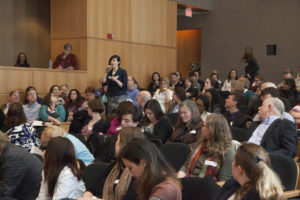 Thanks to the generosity of DCSWA members, DCSWA was able to provide scholarships to a team of early-career writers to document Professional Development Day 2017. Read on for writeups of the panels, HOWs, and plenary session.
Thanks to the generosity of DCSWA members, DCSWA was able to provide scholarships to a team of early-career writers to document Professional Development Day 2017. Read on for writeups of the panels, HOWs, and plenary session.
How to use FOIA laws and public databases to find stories
This panel discussion covered a wide range of questions including why science journalists should regularly file FOIA requests, which agencies can (and cannot) be ‘FOIAed’, tips on how to file a FOIA request, what kind of information can be requested under FOIA, how to decipher the disclosed information, exemptions which allow federal and state agencies to decline FOIA requests and alternatives to FOIA. Read more…
Media Law 101
Remarkably, scientists are one of the three professions most likely to sue journalists for libel. Where available, writers should make use of legal resources and protections provided by employers. Those writers without access to such resources should strongly consider personal media liability insurance, for protection against potential legal costs. Read more…
New Approaches to Video in Social Media
Online videos are an integral part of learning, entertainment, and wasting time. In this HOW, Matthew Wright asked the audience for feedback on how they would edit his video of Project Sidewalk from five minutes to one. In a world of video production, feedback from colleagues can be crucial to making sharp, catchy content, Wright said. Read more…
Self-Editing for Writers
“Editing is a muscle. You need to exercise it, and it will get better.” That was the core message of the HOW on self-editing. The quote, by Lauren Morello of Nature, underscored how writers of all skill levels can apply a few tricks to submit polished pieces every editor will love. Read more…
The delicate art of headline writing
A good headline can make or break your story: it’s the first thing your readers will see and, in a news landscape increasingly driven by social media, often the last. In this HOW, four experienced editors discussed the tradeoffs that must be faced when writing a headline and shared some tips and reminders to keep your headlines from going astray. Read more…
The impressionables: Science communication to engage children and teens
Only about one third of adults understand what science is and how the scientific method works, according to Kristin Erickson of NASA. Studies show that most young school-age children are interested in science, but that for many of them, that interest declines as they get older. So how can we as science communicators help arrest this decline? How can we prevent today’s intrigued children from becoming tomorrow’s ignorant and turned-off adults? Read more…
This is your brand on social media
Audience engagement through social media has become a critical way for publications to reach and maintain their audience. But despite its importance, social media can be confusing and is often underutilized. In this session, panelists shared their expertise on how to expand your reach on social media as well as a few tips on executing these strategies. Read more…
Writer’s aid: Getting more assignments from editors
The first stage in any successful writer-editor relationship is to make a great pitch, panelists said in this session. Familiarity with the publication you’re pitching to is an important first step. Editors appreciate pitches that specify which section of the publication they are intended for. They also stressed the importance of originality and a clear news peg. Read more…

Sorry, comments are closed for this post.